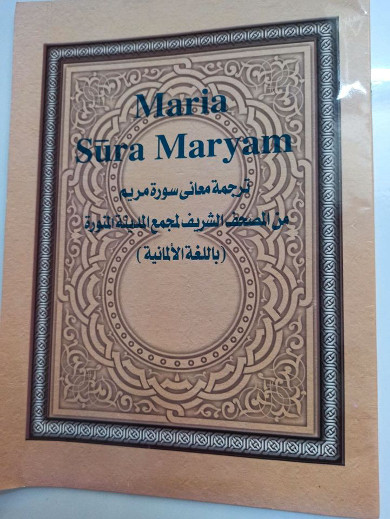The Conveying Islamic Message Society (‘Jamʿiyyat Tablīgh al-Islām’, or CIMS) is one of the oldest Islamic non-government organizations in the world, and is especially interested in Islamic missionary activity, or daʿwah. The ‘call to Islam’ has always been its main priority, and it directs its mission to both Eastern and Western audiences. Now operating from its headquarters in Alexandria, Egypt, it was founded in 1929 in Baden, Switzerland, by an Egyptian engineer called Muḥammad Tawfīq Aḥmad (1902–1991) who was pursuing his studies in Europe. This young Egyptian from the city of Faiyum has an interesting biography: from childhood he was interested in interreligious issues and attended both local Islamic and Christian schools. Though his close ties with Christians angered his family (his father even expelled him from the house), later in life he made calling others to Islam his main goal. Already during the 1920s, while living in Cairo, Muḥammad Tawfīq Aḥmad had started to publish his own newspaper, al-Taqwā (‘Piety’), taking on for himself and his associates the name Jamāʿat al-Waʿẓ al-Islāmī (‘The Society of Islamic Preaching’). Later, during three years of study abroad in Switzerland, Muḥammad Tawfīq Aḥmad started to publish small pamphlets on Islam in German and English. Using the name Dār Tablīgh al-Islām (‘Conveying Islamic Message House’), he also printed posters to promote ‘knowledge of Islam’ among Europeans, displaying them in public places like railway stations. In his memoirs he also tells stories about people who converted to Islam as a result of his distribution of Qur’an translations. For example, according to one such account, a local family in Basel became Muslims after reading a German translation of the Qur’an. During the early 1930s, he pursued a rather innovative approach to daʿwah based on printing and sending books by mail to non-Muslim readers. After his return to Egypt in the mid-1930s, Muḥammad Tawfīq Aḥmad also established a journal named al-Barīd al-Islāmī (‘The Islamic Post’). While living in Cairo, he also finally founded the CIMS, later relocating it to Alexandria, where it is currently based.


Ever since it was first established, Conveying Islamic Message Society has sent out works of Islamic literature all over the world, and it is nowadays also active online: its website, Islamic-message.net, advertises many titles in more than a hundred languages. CIMS usually sends books out free of charge, and most of the material they produce is a reproduction of things that have already been published by other organizations. For example, CIMS has reprinted many books and pamphlets that were originally issued by the University of Al-Azhar, as well as by private publishers based in Egypt and Saudi Arabia; priority has historically been given to stories about ‘new Muslims’ (converts), and the production of small brochures on Islamic history, doctrine, rituals etc. CIMS has also published a lot on the compatibility of Islam and science (in the form of pamphlets that present arguments that Qur’an ‘confirms’ the findings of modern geology, astronomy and biology etc.) as well as a great deal of polemical literature, on subjects such as explaining Islam to Christians. In the 1970s and 1980s, CIMS also printed the works of al-Mawdūdī in translation into English, Spanish and other languages (under the title ‘Fundamentals of Islam’).
Printing and distributing translations of the Qur’an also seems to be part of CIMS’ activities. Since CIMS has never been especially active in producing any new translations, it usually publishes translations that already have an established reputation. Their current strategy appears to be to republish translations that have already been printed by the King Fahd Qur’an Printing Complex (KFQPC). Since 2000, as far as I can discern, CIMS has republished copies of Qur’an translations into German (Bubenheim-Elyas), Russian (Kuliev) and Italian (Picardo), all of which are reproductions of KFQPC editions. In addition to printing translations of the entire Qur’an, CIMS has also reproduced the final, thirtieth, section of the Qur’an, the juzʾ ʿammā, of these interpretations and distributed it (along with various other books) to different Islamic centers, libraries and individuals outside Egypt. Moreover, CIMS has made the interesting choice to printing one particular sura, Sūrat Maryam (Q. 19), as a separate pamphlet in English (using the Hilālī-Khān translation) and German (from the Bubenheim-Elyas translation). The rationale behind this was probably to appeal to Christians by presenting the Qur’anic perspective on the Virgin Mary.



In addition, another CIMS-run website, https://islamic-invitation.com/, provides access to 136 translations of the Qur’an into dozens of languages. Thus, a society with quite a long history, CIMS was among the first Islamic organizations to use Qur’an translations for missionary purposes, years before it became a mainstream endeavor for many other publishers. The CIMS has also become a point of connection for various private and official initiatives from all over the Islamic world, promoting a broad approach when it comes to Islamic missionary work, that includes both Salafi and mainstream Sunni works.
Mykhaylo Yakubovych
